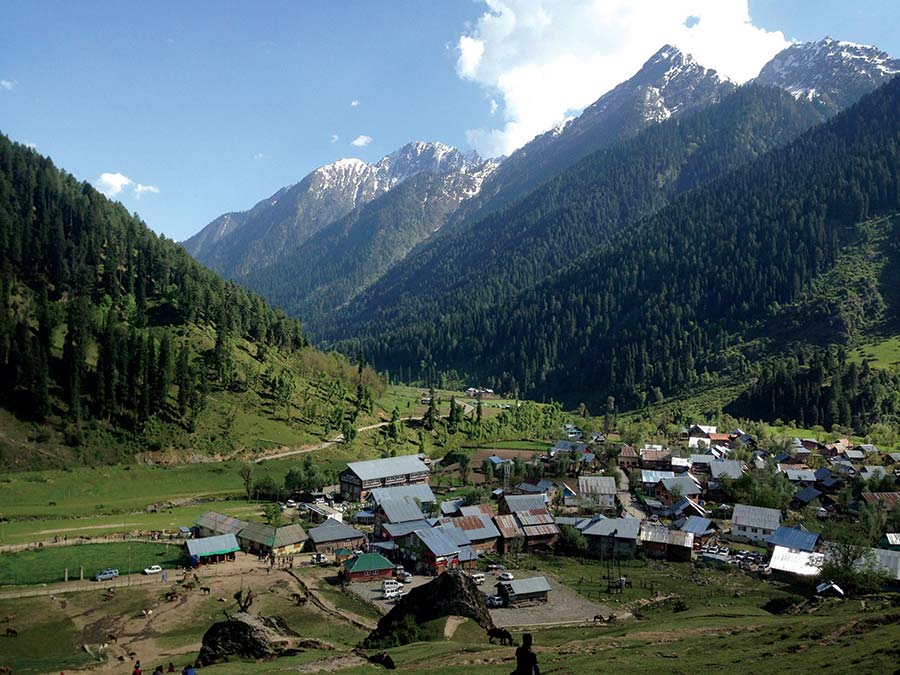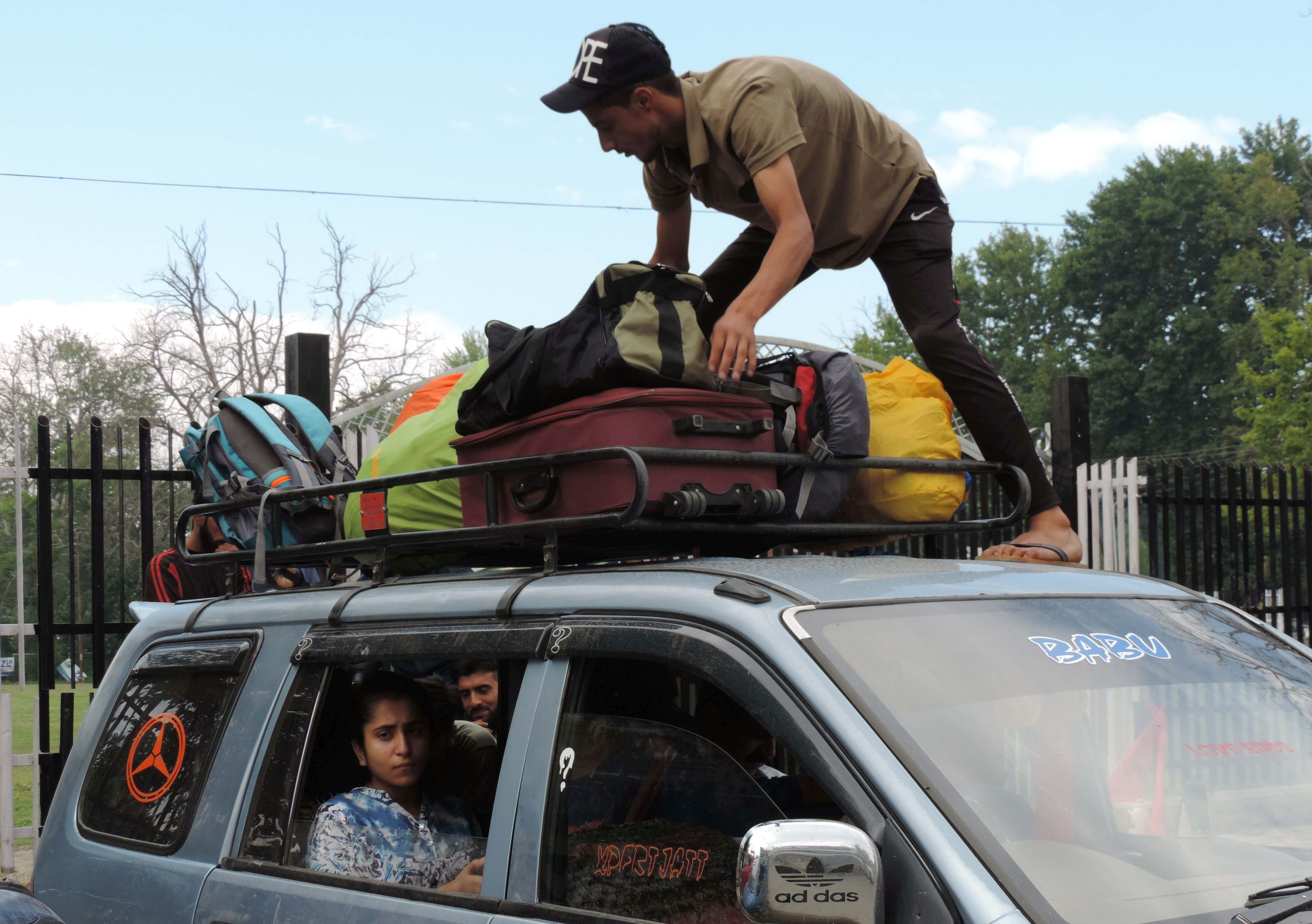by Umar Afzal Dar
There was a huge rush of tourists till August 2019 and that faded in a jiffy when sudden clampdown was imposed by the Government. There has been a death blow to about 33per cent population of Jammu and Kashmir who are directly or indirectly dependent on the tourism sector.

Breathtaking scenery from Aru in Pahalgam. KL Image: Bilal Bahadur
Every year across the globe World Tourism Day is celebrated on September 27. This day is celebrated under a particular theme that changes year after year. This year’s World Tourism Day is celebrated with the theme of Tourism and Development.
This day is celebrated to highlight the unique role that tourism plays in providing opportunities in preserving cultural and natural heritage around the world. The first World Tourism Day was celebrated in 1980 when the United Nations World Tourism Organization (UNWTO) adopted its statutes 10 years before (1970) on the same day. Marking September 27 as World Tourism Day was the brainchild of a Nigerian national- Ignatius Amaduwa Aligbi.
The purpose of this day is to raise awareness among the world populace about the role of the tourism sector from domestic to international level. It demonstrates the social, cultural, political and economic values of the particular regions. Tourism plays a pivotal role in shaping the economy of any state, country or any region. Tourism has the potential to bring huge economic changes for a destination that wishes to develop its tourism industry. Employment, currency exchange, imports and taxes are just a few of the ways that tourism can bring money into a destination.
Some of the facts as reported by the UN’s Economic Impact Report about the economic importance of the tourism industry are listed as:
- Tourism economy represents 5 per cent of world GDP
- Tourism contributes 6-7 per cent of total world employment
- International tourism ranks fourth after fuels, chemicals &automotive products in global exports.
- The tourism industry is valued at the US $1trillion a year
- Tourism accounts for 30 per cent of world exports of commercial service
- Tourism accounts for 6 per cent of total exports
- Tourism is the main source of foreign exchange of one-third of developing countries and one-half of less economically developed countries.
The tourism industry is considered as the backbone of the employment generation. Since the emergence of the Covid-19, life has been out of gear from head to tail. There has been no industry or sector that remained unaffected and the tourism industry has been hit too hard. The world came still when the imposition of lockdown started from mid-February 2020 and is still not recovering to its base. The ban on the travel ban, be it domestic or international, created the economic slowdown worldwide. People who are dwelling in the tourism sector have been facing hardships and fear extension of their services. The people associated with the tourism industry have opted to do try their hand in some other jobs where they can earn their livelihood.

Dal lake, Srinagar’s main tourist hub, as seen from the mountain peak. KL Image: Bilal Bahadur
In Kashmir
When we talk of Jammu and Kashmir in general and Kashmir valley in particular; it is an eye-catching destination for everyone around the world. It is called the Switzerland of the East for its aesthetic scenery.
Jammu and Kashmir is called paradise on earth for its unmatchable scenic beauty and alluring landscapes. From early times of Mughals, the Kashmir has been considered as a hotspot for tourists. From the lofty mountainous regions of Gulmarg, Sonamarg and Pahalgam to the Dal Lake every tourist spot is being thronged by the tourists from India and abroad. There was a huge rush of tourists till August 2019 and that faded in a jiffy when sudden clampdown was imposed by the Government. What happened on political grounds after that is not going to be my discussion point here but what happened to the tourism sector of Kashmir from then is worrisome. There has been a death blow to about 33per cent population of Jammu and Kashmir who are directly or indirectly dependent on the tourism sector.
Tourism as catalysing force is playing a very significant role in the local economy although the recent trends of this industry are not satisfying across Jammu and Kashmir. It is one of the most economically backward parts of India, having all the characteristics of an underdeveloped economy. Due to the vast tourism potential, the tourism-dependent people contribute 16per cent of UT’s domestic product.
Post Clampdown
After a few months of a clampdown in August 2019, the tourism industry had started their business again in December during winters when the tourists started to visit Kashmir after doing various promotions through print and electronic media. No one had imagined that there will be another testifying time of survival for this industry when they hardly started again. The imposition of lockdown in the last week of March 2020 was again a blow to this sector. People had not yet forgotten the aftermath of August 2019 and here another standby plan of lockdown started in this year.

A driver arranges luggage of tourists as they leave Kashmir in Srinagar on August 3, 2019. Authorities on August 2 told tourists to leave Kashmir because of “terror threats. KL Image: Bilal Bahadur
Since this industry has been hit hard from about a year and a proper policy needs to be framed by the Jammu and Kashmir tourism department for the revival of tourism. Since tourism is mainly a private sector driven industry, the Government must act as a facilitator.
On this World Tourism Day, Government must do some exercise on the ground and help the people associated who are turning bankrupt due to non-payment of loans/instalments. Celebrating and spending money on hoarding and advertisement is not bad but to encourage the people associated with this sector is much more important. We should not be in a position that the people who have been in this industry for years will move to some other jobs and at the end, we will have to hire the people to run this sector.
(Author is doing his masters in International Relations and is working at Islamic University of Science and Technology, Awantipora. The opinions expressed in this article are those of the author’s and do not purport to reflect the opinions or views of Kashmir Life.)
from Kashmir Life https://ift.tt/30ekURT
via IFTTThttps://kashmirlife.net
No comments:
Post a Comment